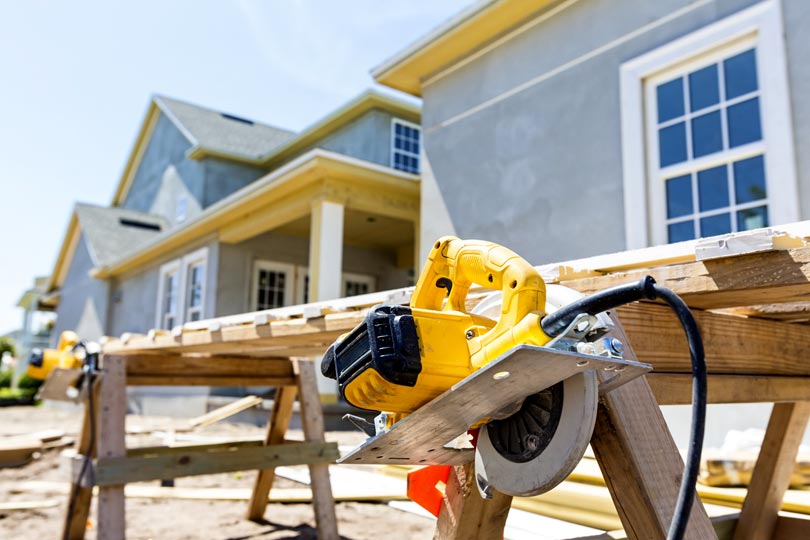Building Your Home: Pitfalls To Avoid

But to get to the finish line, so to speak, there are some risks to avoid. Knowing these risks exist is half the battle for some, and if you are new to the construction loan process, you’ll want to keep the following in mind as you plan the mortgage.
Construction Loan Risks: Breaking Deadlines
Some call it “non-completion” of the home before the construction period is meant to be over.
What can cause a single-close construction loan to run into overtime? Sometimes, it may be supply chain issues, delays due to acts of nature, or an improperly managed construction budget.
Don’t assume the project won’t go over time and over budget. Work with your lender to avoid these issues where possible. Don’t overlook the need for a contingency budget or a construction loan “holdback” if you have certain cost overruns or related problems that may require more funds for completion.
As many will tell you, builders should not be given more money than is justified by the percentage of the work that has been done.
Construction Contingencies
Above, we mention a contingency budget; for those new to the term, this is a financial cushion meant to offset unexpected costs that threaten to push the project over budget. This reserve may come from your own savings, or you may need to finance the additional money.
What is this money typically used for? Unexpected higher costs, for one. That could be the result of inflation pushing up the cost of raw materials and labor, or higher costs may be required in cases where there are delays due to weather or damage caused by it.
Having a contingency reserve anticipating these higher costs is a smart move. The borrower must financially qualify for these additional funds if they must be financed, but the extra effort is worth the peace of mind.
Beware Of A Lack Of Progress Reports
If there aren’t progress reports built into the construction process for your loan, ask your lender why not.
As one source notes, “Reporting ensures that construction is proceeding on schedule relative to the term of the loan and the completion date referenced in the construction contract and the construction loan agreement.” A monthly progress report will help ensure the project stays on track or explains why it is not running on time and on budget.
Want More Information About One-Time Close Loans?
We have extensively researched the FHA (Federal Housing Administration) and the VA (Department of Veterans Affairs) One-Time Close Construction loan programs.
We have spoken directly to licensed lenders that originate these residential loan types in most states, and each company has supplied us with the guidelines for their products.
We can connect you with mortgage loan officers who work for lenders who know the product well and consistently provide quality service.
If you are interested in being contacted by a licensed lender in your area, please send responses to the questions below. All information is treated confidentially.
OneTimeClose.com provides information and connects consumers to qualified One-Time Close lenders to raise awareness about this loan product and to help consumers receive higher-quality service.
We are not paid for endorsing or recommending the lenders or loan originators and do not otherwise benefit from doing so. Consumers should shop for mortgage services and compare their options before agreeing to proceed.
Please note that investor guidelines for the FHA and VA One-Time Close Construction Program only allow for single-family dwellings (1 unit) – and NOT for multi-family units (no duplexes, triplexes or fourplexes).
In addition, the following homes/building styles are not allowed under these programs: Kit Homes, Barndominiums, Log Cabin Homes, Shipping Container Homes, Stilt Homes, Solar (only) or Wind Powered (only) Homes.
Contact Us: Send Us Your Request – Spam Safe
Please send your email request to [email protected] which authorizes OneTimeClose.com to share your personal information with one mortgage lender licensed in your area to contact you.
1. Send your first and last name, e-mail address, and contact telephone number.
2. Tell us the city and state of the proposed property.
3. Tell us your and/or the Co-borrower’s credit profile: Excellent – (680+), Good - (640-679), Fair – (620-639), or Poor- (Below 620). 620 is the minimum qualifying credit score for this product.
4. Are you or your spouse (Co-borrower) eligible veterans? If either of you is an eligible veteran, down payments as low as $0 may be available up to the maximum amount your debt-to-income ratio per VA will allow – there are no maximum loan amounts as per VA guidelines.
Most VA lenders will go up to $1,500,000 and review higher loan amounts on a case-by-case basis. If not, the FHA down payment is 3.5% up to the maximum FHA lending limit for your county.
Do you know what's on your credit report?
Learn what your score means.

July 26, 2024The Federal Housing Administration (FHA) offers qualifying borrowers the option to build a home from the ground up using a Single Close FHA Construction Loan. This program, also known as a One-Time Close construction mortgage, allows borrowers to finance the construction of a new home and convert it into a permanent mortgage with just one closing, streamlining the often complex process of building a house.
July 19, 2024VA One-Time Close construction loans help qualifying veterans build homes they will own and occupy once the construction phase is complete. One-time close loans, or construction-to-permanent loans, combine construction and permanent financing into a single closing procedure. VA One-Time Close mortgages have no VA-required down payment or mortgage insurance, making them attractive options for qualifying borrowers.
July 12, 2024When planning a construction loan, you have many options. For example, do you want to buy land with a loan to build the house? Or do you already own a parcel suitable for the construction project? There are many other choices to make with home loans, but some don’t necessarily apply to construction mortgages.








